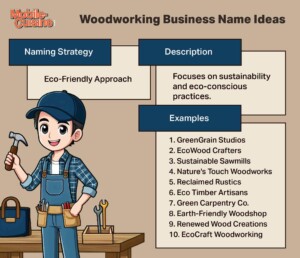

Choosing a name for your woodworking business is a crucial step in establishing your brand identity. It's a reflection of your craftsmanship, your target audience, and the unique character you bring to the craft. This guide will provide you with a comprehensive framework for choosing the perfect name, encompassing various factors and strategies:
1. Understanding Your Business:
Specialty: Do you specialize in a particular style of woodworking, such as furniture, crafts, or custom pieces? Tailoring your name to your specialization will enhance your target audience's understanding of your offerings.
Target Audience: Who are you aiming to reach? Are you targeting home renovators, design enthusiasts, or collectors? Identifying your audience will guide your name's tone and appeal.
Brand Values: What are the core values of your brand? Are you emphasizing quality, sustainability, craftsmanship, or perhaps a blend of these? Your name should reflect these values authentically.
2. Brainstorming and Research:
Wordplay and Associations: Explore the potential for using words related to wood, crafting, or your chosen specialization. Consider synonyms, metaphors, and idioms that resonate with your brand.
Industry Trends: Research current trends in woodworking names, noting any successful or unique approaches. Avoid names that sound too generic or cliché.
Competitor Analysis: Investigate your competitors' names, analyzing their strengths and weaknesses. This will help you position your name strategically.
3. Name Structure and Types:
Descriptive Names: Directly describe your business, like "The Woodworking Studio" or "Artisan Crafted Furniture." While simple, they lack memorability and uniqueness.
Creative Names: Use wordplay, metaphors, or abstract concepts to create a memorable and unique name. Examples include "The Wood Whisperer," "Stained Glass Workshop," or "Cedar & Sage."
Location-Based Names: Incorporate your city or region into the name, like "Boulder Woodworks" or "Southern Pine Creations." This can attract local clientele but limit broader appeal.
Personal Names: Use your name or a combination of names, like "Smith's Woodshop" or "The Jones Family Workshop." This adds a personal touch but may not be as memorable.
4. Essential Considerations:
Memorability and Pronunciation: Choose a name that is easy to remember and pronounce, even for those unfamiliar with your craft.
Availability: Check domain name availability and social media handles to ensure your chosen name is available for online presence.
Legality: Ensure your name does not violate any existing trademarks or copyrights.
Emotion and Appeal: Your name should evoke positive emotions, intrigue potential customers, and create a memorable experience.
5. Refining Your Options:
Feedback: Share your shortlisted names with friends, family, and potential customers to get their feedback on memorability, appeal, and clarity.
Testing: Use online tools like Google Trends to analyze the search volume and popularity of your shortlisted names.
Final Decision: Select the name that best reflects your business, your brand, and your target audience.
6. Branding and Visual Identity:
Logo Design: Develop a visually appealing logo that complements your chosen name and effectively represents your brand.
Color Palette: Choose a color palette that aligns with your chosen name and evokes the desired emotions associated with your woodworking.
Typography: Select fonts that enhance the visual appeal of your name and reflect your brand's personality.
7. Examples of Memorable Woodworking Business Names:
The Woodwright: This name evokes a sense of expertise and craftsmanship.
The Timber Collective: This name suggests a collaborative and community-focused approach to woodworking.
Rustic Roots: This name combines the rustic charm of wood with a sense of connection to nature.
Knotty Pine Workshop: This name incorporates a playful element while highlighting a specific type of wood.
Cedar Creek Designs: This name combines a natural element with a sense of artistry and design.
In Conclusion:
Choosing the right name for your woodworking business is an essential step in building a successful brand. By carefully considering your target audience, your business values, and the broader woodworking landscape, you can craft a name that is both memorable and meaningful. Remember to test, refine, and seek feedback to ensure your chosen name perfectly reflects your unique craft and resonates with your ideal clientele.